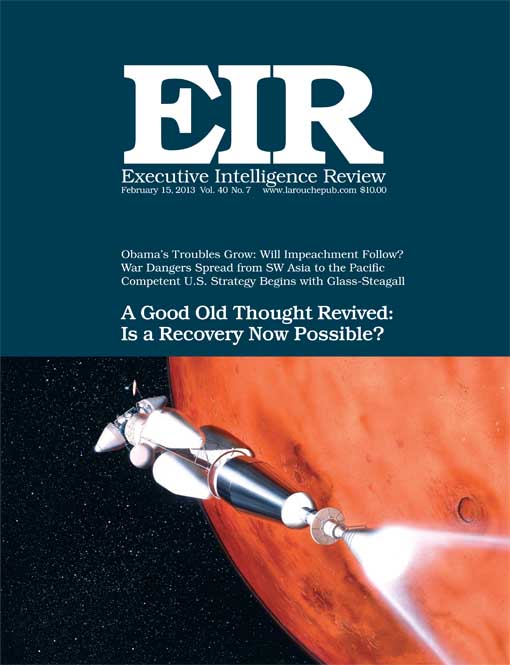|
.
|
|
|
|
Brain, or Mind?:
A Good Old Thought Revived
by Lyndon H. LaRouche, Jr.
February 7, 2013 —It will be important for you, as the reader, to keep in mind, that what I shall have stated in my prefatory remarks here, goes toward certain deep-rooted physical principles. These are principles which have a presently increasing relevance for the continued existence of mankind generally. I shall show this, after, first, presenting what we shall have considered in these somewhat extended, prefatory remarks.
There are some subject-matters which belong to the category of those opinions which are not only wrong, but which do not go away easily. For example, should you say, as many do, that no one actually knows what tomorrow's future might bring, or fail to bring? Yet, on the contrary, some people (if only a relatively few) actually either do, or could know the future as I have done, or could clearly recognize important features of what might be known as intimations of future prospects.
These thoughts should point your attention toward those crucial issues which we will consider in the later sections of this present report.
Ask, for example, such questions as: what is the actually crucial distinction of the mere human brain as such, from the human mind, as in those actually living, noëtic processes which actually do illustrate the successful functioning of what we should be obliged to recognize as the actually creative powers expressed as a human mind's insight into the future? That typifies one among the tougher questions to be considered by us within this report as a whole. ... |
|
|
|
|
- Brain, or Mind?:
A Good Old Thought Revived
by Lyndon H. LaRouche, Jr.
In which LaRouche discusses the 'Mars-Earth relationship,' both in terms of Mars' role in providing a platform from which the 'defense of Earth' might be staged; but more importantly, Mars' broader siginificance for the human species in ending the 'implicit isolation of mankind on Earth': 'It is a matter of our ability to implant on Mars, in particular, sets of apparatus for the included mission of establishing 'remotecontrolled' activity, coordinated with apparatus controlled continually from Earth, as used to control missions assigned to operate from Mars.'
Economics
International
National
Conference Report
- The Role of Classical Music in Saving Humanity Today
For the Schiller Institute's series of conferences on 'A New Paradigm To Save Mankind,' Helga ZeppLaRouche mandated a prominent role for the performance and discussion of Classical music. Here, three exceptional individuals describe their determination to bring about a revival of Classical music, in a world dominated by the ugly sounds of what passes for music today.
|
|
|
Subscribe to EIR Online
For all questions regarding your subscription to EIR Online, or questions or comments regarding the EIR Online website's contents or design, please contact eironline@larouchepub.com.
All rights reserved © 2013, EIRNS |
|
|

